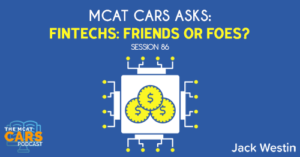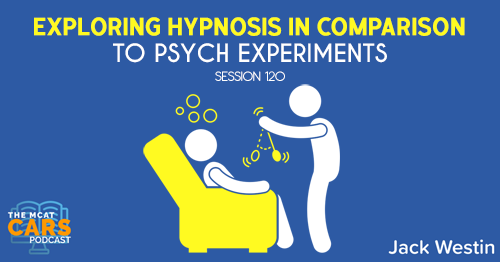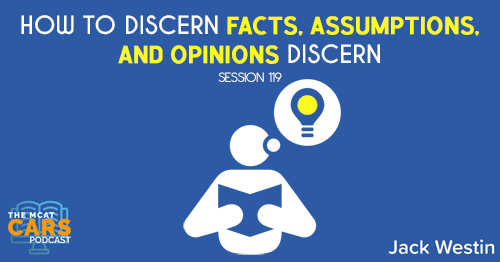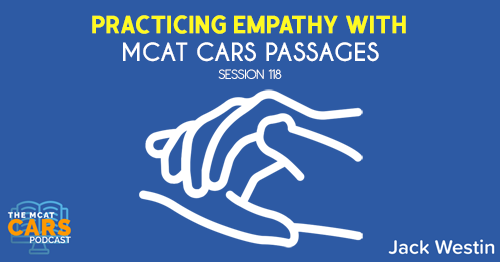Apple Podcasts | Google Podcasts
Session 86
How should you approach a passage that you don’t like? Should you be skipping sentences or passages? You better not! In today’s passage, we talk about something about FinTech. Again, it may not be something that interests you. But if you want to do well on the MCAT, then you cannot afford to just skip through.
I’m joined once again by Jack Westin from Jack Westin. Jack is the premier MCAT CARS expert online. And he has a ton of amazing and exciting things coming up that aren’t announced yet. Check out how Jack can help you and your MCAT prep.
If you want to utilize this the best way possible, read the passage. Come to your own conclusions first and then listen. Go pause, go read, and then come back.
Listen to this podcast episode with the player above, or keep reading for the highlights and takeaway points.Link to the article:
https://reallifemag.com/newly-minted/
A motivational post currently making the rounds on LinkedIn seeks to remind us that several of “the most iconic” companies of the last 10 years — Uber, AirBnb, Venmo — were founded in wake of the 2008 financial crisis. The looming pandemic-fueled recession, the post says, will “undoubtedly” lead to another startup renaissance. Out of crisis comes opportunity, at least for those who have access to a network of investors looking to capitalize on the said crisis.
The current crisis, though, is markedly different from the Great Recession. This time around, a stock market crash didn’t precipitate millions of job losses. Instead, it was a virus that, due to the nature of its contagion, can only be defeated if everyone stays home for as long as possible. People who lost their office jobs in 2008 were able to fall back on hourly retail or food service gigs — or, later, “side hustles” pioneered by the startups that emerged from the rubble of the economic crash. Now there are even fewer jobs to fall back on, but there are still bills to pay.
If any sector of the startup world is poised to thrive during this time of social distancing, it’s the fintechs. Financial technology startups are by far the most nebulous subset of Silicon Valley companies. Rather than giving us something new to spend money on, fintechs essentially create new ways to manage the flow of money itself. The term “fintech” is frustratingly vague — any company that uses technology to “disrupt,” or by definition support and enable, the financial services industry can be considered a fintech, which may explain why the industry reportedly generated $40 billion in investment in 2019 alone. Venmo and PayPal tip jars for laid-off service workers are fintechs; so is the iPad-enabled cash register at the coffee shop I used to go to every morning. There are fintech apps that track your spending and gently chide you when you go over your monthly budget, as well as fintech companies that run all your purchases to the nearest dollar and invest the changes in stocks and bonds.
Savings and investment fintechs are designed for a specific class of user: those who have enough disposable income to set aside some money each month, but not quite enough to hire someone to do it for them. But there are only so many young professionals with money to blow — or save — and plenty of fintechs have instead set their sights on the working poor. Rather than seek to end the cycle of poverty, these companies have simply rebranded services that have long been understood to perpetuate it. As Sidney Fussell wrote last year in the Atlantic, the brave disruptors of Silicon Valley have found a way to reinvent one of the oldest practices known to man: subprime lending. A crop of new venture capital-backed financial services companies are now rebranding payday loans and layaway, two traditional markers of economic precarity, for tech-savvy consumers — largely by claiming to offer something else entirely.
[03:10] Paragraph 1, Sentence 1
A motivational post currently making the rounds on LinkedIn seeks to remind us that several of “the most iconic” companies of the last 10 years — Uber, AirBnb, Venmo — were founded in wake of the 2008 financial crisis.
Jack says:
The key thing here is Uber, Airbnb, and Venmo. Some of these iconic companies were founded in the wake of a financial crisis. We have a financial crisis back in 2008. And then pandemic fueled recession we have right now with COVID. This motivational post is going back to what LinkedIn says that it’ll lead to another startup renaissance. So people will go and start companies and figure out what to do in the wake of all this.
[03:58] Paragraph 1, Sentence 2
The looming pandemic-fueled recession, the post says, will “undoubtedly” lead to another startup renaissance.
Jack says:
Words like looming and renaissance – these are things that ESL students will have a hard time with. So looming pandemic means basically an upcoming kind of recession coming from the pandemic. And then it says a startup renaissance. So if the pandemic is a crisis, especially if it says it’s a recession, then a recession is a crisis.
You don’t need to know exactly what renaissance means or startup renaissance means. A startup is a term for new companies. Renaissance forces a time where we had a big growth in art and culture and all this stuff going on in the 13th century or 14th century. So you could still guess what’s going on here.
[05:57] Paragraph 1, Sentence 3
Out of crisis comes opportunity, at least for those who have access to a network of investors looking to capitalize on said crisis.
Jack says:
There’s an opportunity as long as you have lots of money or availability or access to lots of money. Businesses and investing are all going along the same lines.
[06:26] Paragraph 2, Sentence 1
The current crisis, though, is markedly different from the Great Recession.
Jack says:
After the 2008 financial crisis, there was this huge boom in these iconic companies and we can have that again, as long as you have money. But this time is different.
[06:50] Paragraph 2, Sentence 2
This time around, a stock market crash didn’t precipitate millions of job losses.
Jack says:
The author is pointing to some differences between what happened last time and what is going on right now. If you didn’t know anything about the 2008 financial crisis, well, you now know it’s something to do with stock markets.
[07:15] Paragraph 2, Sentence 3
Instead it was a virus that, due to the nature of its contagion, can only be defeated if everyone stays home for as long as possible.
Jack says:
The author here is pointing again at what this pandemic is and what’s going on with everyone staying home.
[07:45] Paragraph 2, Sentence 4
People who lost their office jobs in 2008 were able to fall back on hourly retail or food service gigs — or, later, “side hustles” pioneered by the startups that emerged from the rubble of the economic crash.
Jack says:
The author is painting a picture of the previous recession, the financial crisis in 2008. All the people who lost jobs could go get other jobs in retail or food and side hustles that maybe aren’t available now because everyone has to be at home.
[08:21] Paragraph 2, Sentence 5
Now there are even fewer jobs to fall back on, but there are still bills to pay.
Jack says:
Not a lot of jobs for people to pick up and the bills are still there. So just it’s different. So what you need to get out of this paragraph is that the two recessions are not exactly the same.
[08:48] Paragraph 3, Sentence 1
If any sector of the startup world is poised to thrive during this time of social distancing, it’s the fintechs.
Jack says:
The author here is saying maybe there’s this one part of the startup world that may do well. And that’s fintechs.
[09:14] Paragraph 3, Sentence 2
Financial technology startups are by far the most nebulous subset of Silicon Valley companies.
Jack says:
So the author here says that fintechs are financial technology startups. If you don’t know what nebulous is, let’s keep reading to find out hopefully.
[09:44] Paragraph 3, Sentence 3
Rather than giving us something new to spend money on, fintechs essentially create new ways to manage the flow of money itself.
Jack says:
There are many companies that give us something new to spend on and these FinTech companies are just helping us move money around differently.
[10:12] Paragraph 3, Sentence 4
The term “fintech” is frustratingly vague — any company that uses technology to “disrupt,” or by definition support and enable, the financial services industry can be considered a fintech, which may explain why the industry reportedly generated $40 billion in investment in 2019 alone.
Jack says:
The author is explaining that the fintech thing is vague and nobody really knows what it is. But they made a lot of money. They’re also explaining what they do – support and enable the financial services industry. That’s what nebulous actually means – it’s vague. It’s cloudy. The author’s definitely painting this picture of shakiness. Or that it’s not clear as to what they’re doing.
[11:09] Paragraph 3, Sentence 5
Venmo and PayPal tip jars for laid-off service workers are fintechs; so is the iPad-enabled cash register at the coffee shop I used to go to every morning.
Jack says:
The author is giving us some concrete examples of what can be defined as a FinTech. I think most people know Venmo and PayPal, and they’re fintechs. And they use them as examples of tip jars.
[11:54] Paragraph 3, Sentence 6
There are fintech apps that track your spending and gently chide you when you go over your monthly budget, as well as fintech companies that run all your purchases to the nearest dollar and invest the changes in stocks and bonds.
Jack says:
The author here again is giving some more examples of potential FinTech apps. So we started off in the first paragraph with the idea that we have these new companies that come after a recession. And then we talked about how this recession is different than the previous recession.
And now we’re talking about what kind of companies actually are succeeding and thriving in this new recession, and that ends up being FinTech. They explained what FinTechs are and gave some examples of them. If you notice the author was sort of suspicious about what they’re doing. But you don’t have to go that far just yet. If they care about something, they’ll bring it up in a very direct way.
[13:27] Paragraph 4, Sentence 1
Savings and investment fintechs are designed for a specific class of user: those who have enough disposable income to set aside some money each month, but not quite enough to hire someone to do it for them.
Jack says:
The author is now talking about savings and investment FinTechs and who they are for.
[13:57] Paragraph 4, Sentence 2
But there are only so many young professionals with money to blow — or save — and plenty of fintechs have instead set their sights on the working poor.
Jack says:
The author is once again bringing in potential little bias which may be bad but it sounds like the author here again is suspicious that the fintechs are out there trying to steal money from the working poor.
[14:32] Paragraph 4, Sentence 3
Rather than seek to end the cycle of poverty, these companies have simply rebranded services that have long been understood to perpetuate it.
Jack says:
There’s a very negative claim in the statement that this is not good for the working poor. And that’s the sentence we’ve been working so hard to look for. This is why you have to read each sentence of the passage because how could you have caught on to what the author’s trying to say unless you read the whole thing?
'You have to understand every passage if you want to do well.'Click To TweetYou can’t skip any of these passages because every passage has at least four or five easy questions. Try to tackle it in practice. If you don’t like these kinds of passages, read more of them.
Don’t do the easy passages that you enjoy. Do the ones that you don’t enjoy that are bland and are hard and you just don’t enjoy, and just don’t like reading. Eventually, you’ll come to like them and appreciate them and not fear them.
[16:59] Paragraph 4, Sentence 4
As Sidney Fussell wrote last year in the Atlantic, the brave disruptors of Silicon Valley have found a way to reinvent one of the oldest practices known to man: subprime lending.
Jack says:
We’re given an author of some sort of paper that was in the Atlantic or an article that was in the Atlantic, which is a publication that’s italicized here. And it looks like Sidney Fussell here is supporting this negative look on these FinTechs in that they’re reinventing this way to perpetuate the working poor.
All the things that the author is pointing out are that they’re not helping the poor, they’re actually making them poor. Then you don’t need to know a lot about subprime lending, but it’s probably something that hurts the poor. That’s definitely the case for 2008.
[18:00] Paragraph 4, Sentence 5
A crop of new venture capital-backed financial services companies are now rebranding payday loans and layaway, two traditional markers of economic precarity, for tech-savvy consumers — largely by claiming to offer something else entirely.
Jack says:
Most people know payday loans layaway, and what that potentially means. The author here is saying that the FinTechs are fakely claiming to offer something else entirely.
[18:35] Main Idea
The message here is that FinTech startups are just perpetuating the poor in a bright new way. They’re just calling it something totally different.
[20:10] How to Read Passages
Jack’s best message is to be normal. Think about what a normal person does when they read these passages and just do that. Think about what an ideal reader would do. An ideal reader is someone who reads and is not going to try to trick or game the system.
Read it slowly. Pay attention to what you’re reading. Understand it. Reading it sentence by sentence like we’re doing together is ideal.
“Eventually, when you do this enough, it becomes a habit. It becomes the way you read.”Click To Tweet[21:17] Don’t Use Timer as an Excuse
The hardest part of all this is the timing aspect. Many students will try to convince themselves they can’t read slowly and understand things because of the timer.
Forget the timer. Focus on understanding what you’re reading. Because if you can do that, you’re going to get through these questions a lot faster.
If you bring up the timer as an excuse every time you’re reading something, it’s because you don’t want to put in the mental energy and the effort. And when you get to the questions, you’re going to get stuck. Then you would spend even more time going back to the passage and trying to figure things out and confuse yourself in the end along the way.
'Read everything the way we're reading and you will ultimately get better with practice.'Click To TweetLinks:
SEARCH SITE
SEARCH SITE
LISTEN FOR FREE












